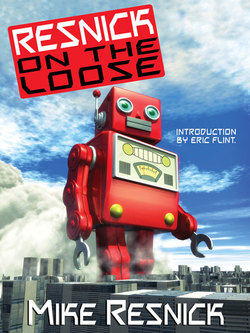Читать книгу Resnick on the Loose - Mike Resnick - Страница 18
На сайте Литреса книга снята с продажи.
ОглавлениеJoe Smith
There’s a secret author I want to tell you about. You don’t know him, but you’ve bought some of his books. You probably didn’t think much of them, but it didn’t stop you from going out and buying more.
Editors don’t like to talk about him much, because sooner or later they’re forced to deal with him, and they don’t dare reject him. Writers know about him, but he’s got a lot of friends and a lot of clout, so they only talk about him to each other, in private. Critics know all about him, but they’re not being paid to review his books—exactly.
So it’s up to me to tell you about him.
A little background first: if a writer becomes successful enough, the day will come when he is, in the parlance of the field, “editor-proof.”
What does it mean?
Simply this: no editor will dare risk losing that writer by performing his editorial duty thoroughly and properly.
You can write the scene yourself. “Stephen baby, it’s a wonderful book, but it drags at the end, so could you tighten it a bit, please—maybe cut 20,000 words? Oh—and lose the brother, who doesn’t contribute anything to the story anyway.”
And the second scene, which follows immediately, is just as easy to write: “Screw you, fella. I’m taking the book down the street to Editor B, and he’s going to take it (and, of course, me) without changing a word, and it’ll my usual million hardcovers and three million paperbacks, and he’s going to get rich, and my new publisher’s going to get rich, and of course I’m going to get richer—and you, you poor son of a bitch, when your publisher finds out you let me get away, regardless of the reason, you’re going to be on the unemployment line next week.”
That’s what it means when we say that a particular writer is editor-proof. Every field has a few of them, including science fiction.
Now, writers have as much pride in their work as anyone else, and very, very few of them turn in a piece of hackwork that they know is hackwork. They do their best, and everyone in the field will grant them that.
But try as they will, they don’t always produce their best work first (or third, or fifth) time out of the typewriter or computer, and that is what editors are for. But as I pointed out, some editors are unable to fulfill their function when dealing with an editor-proof writer. They accept the manuscript, whatever the length, whatever the market, without question, or they lose the writer and probably their jobs.
So now and then, probably a little more often than we’d like, a very improvable book hits the stands, and it sells like crazy, based on the author’s name, reputation, and past performances—but it’s a turkey. The emperor has no clothes, and sooner or later most of the readers realize they’ve bought another book by Joe Smith.
Yeah—Joe Smith, Whenever one of these books (or stories) hits the stands, the writers and editors will admit, very softly, when almost no one is listening, that it didn’t pass what has come to be known as the Joe Smith Test.
Which is to say, if the very same manuscript showed up on the editor’s desk, and the author’s name was Joe Smith, instead of Stephen or Dean or Danielle, could it have sold? And the answer is invariably: No. It sells based on the author’s reputation and readership, rather than on its minimal quality.
How many books by Joe Smith have you bought lately?
